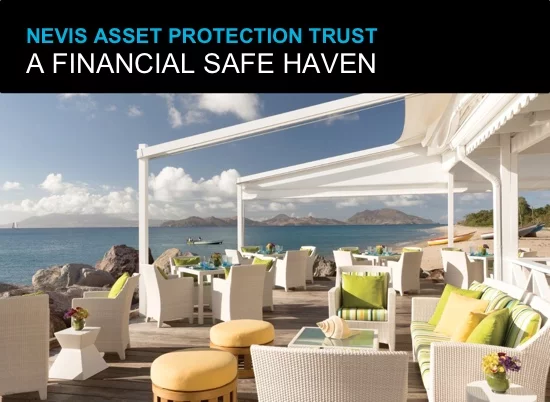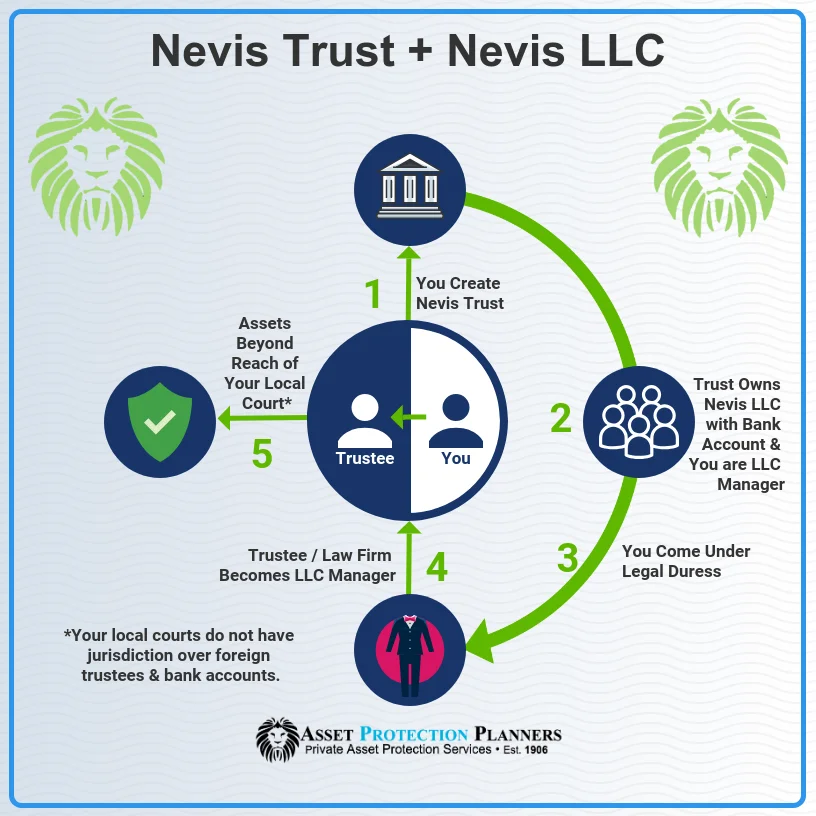The Nevis Asset Protection Trust is a trust established in the Caribbean island of Nevis under the Nevis International Exempt Trust Ordinance (NIETO). NIETO was initially established in 1994. Amendments in 2015 further strengthen and enhance the asset protection features of various legal tools, including a Nevis trust. If you look at a comparison chart you can see how the Nevis trust legislation stands above other jurisdictions. Current Nevis trust legislation is one of a settlor’s staunchest allies in ensuring that assets are secure. In a Nevis trust, legal provisions help insure holdings remain sheltered, confidential, and virtually beyond the reach of predatory creditors.

Nevis Trust Benefits
Here is a summary and a list of benefits of a Nevis trust. We discuss the trust in more detail below. We make references to the Nevis International Exempt Trust Ordinance of 1994 and its amendments.
- $100,000 US bond – In 2015, an amendment stated that a creditor must post a $100,000 USD ($270,000 Eastern Caribbean Dollar) bond with the Nevis Ministry of Finance before bringing legal action against an international trust. Whereas the a 2018 amendment changed the Nevis LLC bond requirement to any amount established by the Nevis High Court, the bond for the Nevis trust remains at $100,000 US.
- Self-settled trusts protect assets – Unlike most jurisdictions, the settlor (the one who creates/funds the trust) can also be a beneficiary and enjoy asset protection. “A settlor or trustee of a trust may also be a beneficiary of the trust.” Section 32.(4). In most jurisdictions, being both settlor and beneficiary negates the asset protection. In Nevis, you can even set up a one-person trust where you, as the settlor, are the only beneficiary. Alternatively, you and your spouse (or others, for that matter) can share beneficial interest in the trust. You can name heirs, such as your children, to become beneficiaries up on your passing.
- Short statute of limitations – The Nevis trust statute of limitations on fraudulent conveyance is as little as one year, or two years from the cause of action (such as a car wreck). In short, fraudulent conveyance is generally a civil (not criminal) matter where one moves assets beyond of the reach of creditors. Keep in mind, this is not saying the assets need to be in the trust for this long before the trust protects them. It is saying that the courts won’t hear a case challenging asset transfer into the trust once this time has passed. See the difference? It just means when the requisite time passes, a fraudulent conveyance challenge will fall on deaf ears with the Nevis High Court. In comparison, with a Cayman Islands trust, six years must pass before it protects trust assets.
24.(3) A trust settled or established and a disposition to such trust shall not be fraudulent as against creditor of a settlor–
(a) if settled, established or the disposition takes place after the expiration of 2 years from the date that such creditors cause of action accrued; or
(b) where settled, established or the disposition takes place before the expiration of 2 years from the date that the creditors cause of action accrued, the creditor fails to commence such action before the expiration of 1 year from the date such settlement establishment or disposition took place. - Nevis does not recognise foreign judgements – This means your opponent must start a new trial from square one. Section 28.
- Trust can last indefinitely – The rule against perpetuities does not apply. Most countries limit the number of years trust can remain active. Nevis allows trusts that can last indefinitely.
- Non-recognition of foreign judgements – Nevis does not recognize foreign judgments. (It is one of the few countries that offer this benefit.)
- Can divide or combined trusts – The Ordinance allows the trustee to combine two trusts into one or split one trust into two separate ones. The trustee can take this action (usually at the request of a settlor or beneficiary) as long is it does not hinder the rights of a beneficiary or go against the purpose of the trust.
- Freezing order banned – Most British law jurisdictions call a temporary restraining order (TRO) a Mareva Injunction or Freezing Order. In other jurisdictions, such as the Cook Islands, your opponent can request a Mareva Injunction that freezes trust assets. This can make it very difficult to pay legal fees should if your assets are wrapped up on the trust. Nevis has banned a creditor’s use of the Mareva Injunction with respect to Nevis trusts.
Section 22 (as amended)
“(4) No action or proceeding (whether substantive or interlocutory in nature) shall be heard, and no injunction, order of any kind, or any other relief or remedy, whether legal or equitable, shall be made, issued, granted or ordered, by the Court concerning an international trust where the purpose of such action or proceeding would be to detain, inspect, garnish, attach or otherwise interfere in any manner whatsoever or possible with:
(a) any trust property wherever situated whether in St. Christopher and Nevis or elsewhere, or
(b) any right, duty, discretion, obligation or power which a trustee may have in respect of any trust property.”
- Recognizes tenancy by the entireties – If a married couple owns property by tenants by the entireties (TBE), the trust continues to recognize the property as TBE property. TBE is a form of ownership in some states that prevents a creditor of one spouse from taking marital assets owned in this fashion.
- Investment options – The trust can hold a wide variety of investments and other assets. This can include bank accounts, stock market investments, most real estate and more. One exception is that the trust cannot own land in St. Kitts / Nevis.
- Strong burden of proof – The creditor bears the burden of proof. Refer to Section 24.(1). In addition, the only remedy for a creditor is to bring a fraudulent transfer action. The creditor action in Nevis must take place before one year after one establishes and funds the trust. Moreover, the creditor must prove beyond a reasonable doubt and with clear and convincing evidence that the Settlor established the trust to keep money from that particular creditor. So, your creditor does not win if it proves its case on a 51%/49% by the “preponderance of the evidence” basis. Instead, your creditor must prove its case to the courts on a, let’s say 97%/3% basis. This is a much higher wall for your opponent to scale. This means, for example, if the Settlor set up the trust for any other reason, such as international diversification, estate planning, etc., it would be very difficult for a creditor to prevail. Moreover, the creditor risks forfeiting the $100,000 USD bond. In addition, the creditor must reimburse you for your legal fees.
- Strong asset protection – A creditor cannot force a trustee to make a distribution from the trust. Additionally, if the trust has a protector, a creditor cannot force the protector to take action against the wishes of the Settlor as specified in the trust. Most importantly, the trustee can make payments to or for the beneficiary without creditor liability.
- Contingency fee attorneys not allowed – This means the creditor must pay out of pocket before starting litigation.
- Local attorney only – Your creditor must hire a Nevis attorney. This is a challenge for your opponent because most Nevis attorneys (and the top-rated ones in our experience) represent trust companies and financial institutions.
- You chose your heirs – The trust ignores forced heirship rules of the Settlor’s home country. That is, the Settlor decides who inherits his or her trust estate, not the government.
- Experienced trustees – Nevis has been offering offshore privacy and protection tools since 1984. The trustees and registered agents are some of the most experienced in the offshore financial services industry. Keep in mind, trust case law generally employs the “step into the debtors shoes” theory. Whatever the debtor could do directly, the creditor can step into his or her shoes and do that same. That is why you need an independent third-party trustee, such as our Nevis law firm. A Nevis trustee is not subject to foreign court orders.This is what that means. The creditor only has rights to trust assets if the Settlor has direct access to them. Likewise, the creditor only has access to the Beneficiary’s interest if the Beneficiary has the right to revoke the trust and assign trust property to the Settlor (or his estate, or creditors). So, that is why it is important that an experienced professional drafts the Nevis trust. That is another reason why an experienced trustee is essential. Our organization has been forming companies in Nevis since 1994.
This is an important note to those who dig deeper and read the Nevis International Trust Ordinance 1994. Be sure to also see the amendments to the ordinance. There have been significant changes over the years that you will not see in the original 1994 version.

What You Need
Now, let’s talk about what is needed under the Nevis International Trust Ordinance:
- Trustee – The trust needs at least one trustee. We provide licensed, bonded trustees in Nevis. The trustee can be a person or a corporation under the Nevis Business Ordinance.
- Settlor & Beneficiaries – The Settlor and the Beneficiaries are at all times Nevis nonresidents.
- Due Diligence – International regulations require that the trustee maintains know-your-client (KYC) documentation. This includes items such as a notarized color photocopy of your passport, original utility bill showing residential address and bank reference letter.
- Funding – You will fund the trust with assets. Most Nevis trusts own one or more Nevis LLCs that hold the bank / investment accounts. That way you can be the LLC manager and signer the accounts. You remain in this position until you need our trustee/law firm to step in as LLC manager to protect you.
There is also a very reasonable annual renewal fee to keep the trust active. This covers the trustee. After all, none of us would work the rest of our lives for free. It also covers the annual government fee.

Nevis Trust Anti-Injunction Provision
Once a Nevis offshore asset protection trust is set up properly, a trustee is appointed who will administer the trust according to the trust deed and optional Letter of Wishes from the settlor. Though usually not used, Nevis laws does allow for the addition of a protector. The protector of the trust can oversee the actions and decisions of the trustee. They can help ensure that the trustee carries out wishes of the settlor. However, a protector is not a mandatory requirement for establishing a trust in Nevis. The protector can direct a trustee to take a course of action (such as to distribute an interest or not). They can even, under certain conditions, relieve a trustee of his or her duties pertaining to trust management.
As an example, let’s suppose that a non-Nevis court issues an injunction against a trustee or protector. The court order compels them to take a course of action that would compromise the integrity of the trust. This provision can automatically and immediately remove them from their roles as trustee and/or protector of the Nevis trust. No further action has to be taken by the trustee, protector, or the settlor. Even Nevis courts need not lift a finger for this automatic “dismissal” to be in effect. A successor trustee or protector will then take over the role according to the terms of the trust. If there is no provision for this in the trust, the High Court of Nevis can appoint a successor. The successor must adhere closely to the conditions and purpose of the trust and under the guidance of Nevis laws.
Anti-Injunction Clause Means Three Things:
1. A trust will not be without a trustee (or protector, if provisions for one were included in the terms of the trust).
2. Even a foreign court compels the trustee or protector to accept a judgement, the trust itself will remain secure. This is because by the very judgement against them, they immediately cease to have any connection to, let alone power over, the trust.
3. Most importantly, within the proper asset protection framework you can choose another trustee. Better yet, you may choose to have your trust governed in another asset protection jurisdiction all together. A Nevis trust can become a Cook Islands trust, Belize trust or Isle of Man trust, for example.
For more of a foundation on how an offshore asset protection trust works, you can visit the following link. It discusses the mechanics and how-to’s of the strongest international protective tool.

No Claim on Discretionary Interest
What is a discretionary interest in a trust? If a beneficiary’s interest in a trust lies within the discretion of the trustee, it’s called a discretionary interest. A discretionary interest in a trust is not the same as a property interest, such as owning a boat or a building. Neither is it an enforceable right, like a wage or salary. Thus, depending on the terms of the trust, the trustee may or may not grant it to the beneficiary. This is what provides the asset protection. If a beneficiary could take such action directly, a judge could force the settlor to take funds out of the trust and give it to his judgment creditor. Granting this authority to a third party can tie the hands of a judge from forcing a beneficiary to cough up funds.
Example
As an example, suppose a creditor wins a judgement against a beneficiary who has a discretionary interest in a Nevis trust. The creditor cannot force the trustee to distribute the beneficiary’s discretionary interest to the creditor instead of the beneficiary. At the same time, however, Nevis laws permit the trustee to continue to make third-party payments on behalf of the beneficiary. Examples are such as university tuition or health insurance premiums. These payments can continue for as long as the distributions are in accordance with the terms of the trust.
The creditor is powerless to halt such third-party distributions, nor force the trustee to allot these distributions to them instead. In fact, a trustee can exhaust a trust’s principal and interest for the benefit of the beneficiary. A creditor, even with a charging order in hand, will be powerless to do anything about it. Is the settlor is also a beneficiary of the trust? If so, everything said in this section about the beneficiary holds true for the settlor as well.
As is clearly evident, Nevis trust law severely limits a creditor’s ability to get to a beneficiary’s discretionary interest.

Nevis Trust Anti-Duress Clause
The amendments to the Nevis trust laws allows a trustee to ignore a settlor’s directions if the settlor is acting under duress. In this instance, duress often means the settlor is following a court order from a non-Nevis court with regards to the distribution of his assets or interest in a trust. This has long been the practice on the island with regards to trust administration. However, making it an express provision in the law gives settlors an added layer of legal protection. Furthermore, Nevis law protects a trustee, acting in this capacity, from any legal recrimination arising from a creditor’s further action. If by some chance, a creditor is able to successfully bring a charge against a trustee (a highly unlikely scenario), the anti-injunction provision kicks in. Once again, a Nevis trust will thwart a creditor’s attempt to appropriate its interests and/or assets.
Settlors Retain Certain Powers
In Nevis, a settlor of a trust is allowed to retain certain powers over the trust. They can also receive certain benefits from it. In other words, within limits, one can be both a settlor and a beneficiary of a trust. Under Nevis Trust legislation, this in no way invalidates a trust. Why is this important? For a trust to be valid, one of the required conditions is the Certainty of Intention. This means it must be clear that the settlor is surrendering his or her ownership of the assets in the trust. This is why the services of a trustee becomes necessary. It is because the trustee (under the terms of the trust) holds the assets (but does not derive any benefit from them).
This is important. If the settlor/beneficiary retains too much control over the trust, that can hinder its asset protection provisions. In most jurisdictions, a cunning creditor can argue that the trust did not fulfill the conditions of the Certainty of Intention. This could render the trust void. And without the protection of the trust, the assets of a settlor become fair game. Under existing Nevis trust laws, however, the retention of the settlor of certain powers and his or her enjoyment of certain benefits from the trust does not automatically void the trust. This may qualify as a lack of Certainty of Intention in other jurisdictions, but not in a Nevis court.

Creditors Face Prohibitive Costs
A creditor may have won a judgement against a settlor of a Nevis trust from an outside jurisdiction. But this does not mean that it is automatically enforceable on the island of Nevis. Just like any sovereign country, Nevis abides by its own set of laws. When it comes to trust cases, there is a non-negotiable rule. That rule is that all lawsuits against a Nevis trust must be tried in a Nevis court. No exceptions.
A creditor may be shocked to discover that Nevis legislation requires a bond of US $100,000 to be deposited in a Nevis bank before his or her claim can even be docketed in a Nevis court. This is set aside for any court fees and other expenses that the creditor may incur throughout (or even after) the trial. If a creditor loses in a Nevis court, the creditor also pays for the expenses that the defendant incurred as well.
Nevis trust laws also require a creditor suing a Nevis trust to retain a local Nevis attorney to represent him or her in court. Once again, a creditor may be surprised to find out that Nevis lawyers do not work on a contingency basis. A creditor will have to pay for legal services upfront. Typically a large deposit is required. Hourly fees and other expenses are taken from the sum as the case progresses in court (or not). While these costs may seem prohibitive, they are perfectly legal and acceptable under Nevis laws.

Nevis Trust Conclusion
A Nevis trust has long been a preferred instrument for individuals who wish to preserve their assets and protect them from unwarranted claims. However, the Nevis trust legislation 2015 amendments endow a Nevis trust with even more potent asset protection features.
The strong and unequivocal language of its anti-duress and anti-injunction provisions will frustrate none but the most determined claimant. Efforts to breach the trust through the trustee or protector are continuously thwarted. At the same time, there is a broad and generous interpretation of a settlor’s right to exert a measure of control over the trust. The settlor can derive benefits from it. By doing so, Nevis trust laws do not see it as a violation of the Certainty of Intention condition. As if these are not daunting enough, there is the expense of mounting a lawsuit against the interests and assets of a Nevis trust. This may just be the final hurdle that will stymie any efforts to penetrate a trust that has been properly set up on this ideal offshore location.
Nevis asset protection laws give settlors the satisfaction of knowing that the assets and interests they worked hard for are preserved and used only for the goals they intended. Overall, this satisfaction and peace of mind may just be crown jewel of the Nevis trust laws.
Nevis Trust Frequently Asked Question
How does a Nevis trust provide superior asset protection in jurisdictions with strong creditor claims?
Nevis trusts have become reliable asset protection solutions for individuals and business owners with high net worths. These trusts act as sophisticated financial shields for safeguarding wealth in a world where lawsuits are increasingly common.
Even in jurisdictions with strong creditor claims, Nevis trusts provide superior offshore asset protection. Here are some key features that make this possible:
- Legal Safeguards and Ironclad Privacy
- Local laws
- Refusal to recognize foreign judgments
- “Spendthrift” provisions
- Flexibility
- Divorce and family dispute protection
Nevis asset protection trusts are highly reliable because of the legal safeguards and ironclad privacy laid out by the Nevis International Exempt Trust Ordinance. This ordinance offers an exceptional level of privacy to anyone who establishes a trust. Unlike many other jurisdictions, Nevis does not require trust documents to be filed in the public records. This confidentiality ensures that creditors can’t readily obtain the details of your trust.
Local laws, such as short statutes of limitation and high standards for proving fraudulent conveyance, are a central element of Nevis trusts. These laws make it nearly impossible for creditors to access your protected assets.
Another powerful aspect of Nevis trusts is their refusal to recognize foreign judgments. Even if a creditor wins a case in another country, they’d have to start from scratch in Nevis courts. This provision and the substantial bonds required to start a lawsuit in Nevis act as a strong deterrent to frivolous claims.
Nevis has also included powerful asset protection features. For example, many trusts include “spendthrift” provisions. This concept was initially meant to prevent beneficiaries from prematurely accessing or squandering trust assets. Nevis has taken this powerful concept to prevent creditors from accessing trust funds. Suppose a foreign court orders a beneficiary to turn over trust funds. The Nevis trustee company can step in to prevent it.
Flexibility is another hallmark of Nevis trusts. For instance, you have the freedom to move the trust to another jurisdiction, such as the Cook Islands or Belize. You can also designate a “protector” to oversee the trustee company. This structure allows you to customize your approach to managing and securing your assets.
Nevis trusts offer an additional safeguard for divorces or family disputes. That is, you can set up a trust on your own. So, you don’t need to resort to a romance-killing prenuptial agreement or hire separate lawyers for each party. Nevis trusts provide a powerful safeguard during divorces or family disputes, helping to protect your assets from unfavorable division in court. It’s like having a prenuptial agreement but with the added strength of international protection.
Ultimately, the wealth of protections established by the Nevis statutes effectively prevents creditors from obtaining assets that you have placed into a Nevis trust. The high legal threshold for challenging these trusts enables you to confidently plan for the future without worrying about losing your assets.
It’s important to note that while Nevis asset protection trusts offer robust protection, they should be used responsibly. The goal is to safeguard legitimately acquired assets against unjust claims, not to evade taxes or government regulations.
If you’re considering establishing a Nevis trust, it’s advisable to consult with a specialist in this area, like Asset Protection Planners. Their expertise can ensure you leverage all the protective features effectively, maximizing your asset security.



